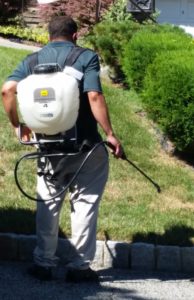 Buyer beware when it comes to lawn care services. Lately I've been seeing a number of lawn care companies saying they offer "organic-based" or "organic weed-free lawn care" or "natural lawn care". Nope, nope, nope.
Buyer beware when it comes to lawn care services. Lately I've been seeing a number of lawn care companies saying they offer "organic-based" or "organic weed-free lawn care" or "natural lawn care". Nope, nope, nope.
These companies do NOT provide organic lawn care. Instead it's the same old routine of using toxic pesticides disguised with organic, environmentally friendly buzzwords. And yes, these pesticides are harmful to adults, children, pets, wildlife, birds, bees, butterflies, and the environment.
How do you you know that they are not providing organic lawn care?
1) One big tip off is "weed free" lawns. Nope. A real organic lawn has diversity of plants - for example, clover. Only toxic pesticides can give you the sterile carpet look. Yes, an organic lawn can be lush, beautiful, and green, but it's different than a sterile carpet with only 1 species of grass (a monoculture).
2) Another warning sign is that they routinely apply "preemergent herbicides" (weed-killers). Nope, nope, nope. For example, one popular herbicide used by such companies is 2,4,-D. This was one of the 2 pesticides used in Agent Orange, and yes - it sticks around. Yikes!
3) They use the word "organic-based". They generally use this only when discussing fertilizers. Hah! Talk is cheap. I haven't yet seen evidence of real organic fertilizers being used.
4) They will routinely schedule "insect control" - of course, by using toxic pesticides. If they were real organic, they wouldn't do that - it wouldn't be needed and/or desired.
By the way, pyrethroids are synthetic toxic pesticides - they are NOT from chrysanthemums and have different effects, such as being toxic to bees and butterflies, and with harmful effects on humans, especially children. They are not used in real organic lawn care.
Look for: Real organic lawn care companies focus on building a lush green lawn by improving the soil (includes the use of fertilizers and soil amendments) and using good grass seed. There is no use of conventional pesticides. [Sample guideline of organic lawn care.]
Some organic lawn care companies use corn gluten for weed control. It's applied in the spring as a preemergent weed suppressor, and maybe later in the summer. It diminishes the number of weeds, and acts as a fertilizer, but it does not eliminate all weeds.
The goal should be a pesticide free lawn. This is safe and best for everyone and the environment. Embrace diversity in the lawn - think of your lawn having wildflowers and not weeds.
Because of the plant diversity in pesticide free lawns, only pesticide free lawns can support bees - a bee habitat!
By the way, mowing and leaving the grass clippings on the grass are a great way to provide some fertilizer to your lawn. Applying vinegar or boiling water directly on weeds on a warm or hot sunny day can kill the weeds. Or can manually pick weeds with a weeding knife or other tool.
And last - healthy soil has a a diversity of microbes and microorganisms living in it (e.g., bacteria, fungi, nematodes, worms). The soil microbiome! Pesticides screw with and alter it in a harmful way.
